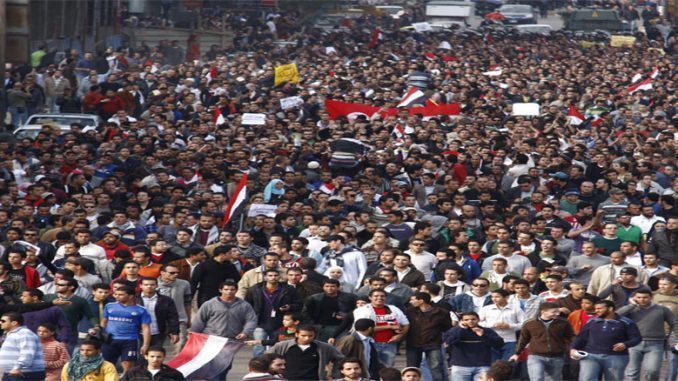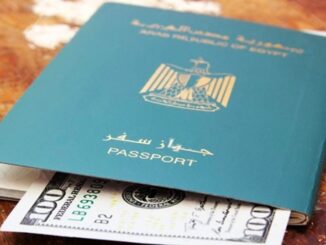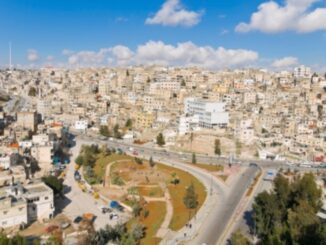
As the country marks the anniversary of the Tahrir Square protests, Abdel Fattah al-Sisi is jailing dissidents, expanding censorship and perhaps looking to remain in power indefinitely.
Eight years ago this week, protests erupted in Cairo’s Tahrir Square, with throngs of Egyptians demanding an end to autocratic rule and chanting the slogan, “Bread, freedom, social justice.” A fierce and joyful revolution soon followed, pushing out Egypt’s longtime autocrat Hosni Mubarak and briefly making the country a global symbol of popular rebellion. But for many Egyptians, it is a bitter anniversary. Abdel Fattah Al Sisi, the former general who became Egypt’s president after a 2013 coup, vows that such protests will never happen again and has pushed the country into the vanguard of resurgent authoritarian states.
“None of these demands were achieved. No bread, no freedom, no social justice. Not even human dignity,” said Haitham al-Hariri, one of a tiny group of opposition members in the national parliament.
The 2011 protests called for an end to Mubarak’s three-decade rule and forced him from power. Today, supporters of al-Sisi’s military regime are organizing a campaign to remove presidential term limits from the constitution—a move that could allow him to rule Egypt indefinitely, much like Mubarak.
The uprisings of the Arab Spring, epitomized by the 2011 Egyptian revolution, demanded political freedom in a region long dominated by autocrats. Idealistic Egyptians faced off against Mubarak’s police, who were known for torture and petty corruption. At least 846 protesters were killed by security forces in 18 days, according to an official tally. The protesters inspired a series of revolts against oppressive rulers across the Arab world.
Eight years later, Sisi’s government is restricting freedom of expression more than Mr. Mubarak ever did, jailing thousands of dissidents, expanding censorship of the media and banning key opposition parties. Al-Sisi expresses his affinity for other strongmen, such as Russia’s Vladimir Putin, Saudi Arabia’s Mohammed bin Salman and China’s Xi Jinping. By combining political repression with economic growth, he is now trying to turn the page on an era of rebellion that left a deep imprint on the Arab world’s most populous country.
“He’s pushing all the time toward the idea of forgetting the revolution,”says Tareq El Khatib, a Cairo-based real estate sales manager whose brother was killed during the 2011 uprising.
Al-Sisi’s crackdown is no mere restoration of the political order under Mubarak. The current government has replaced the coterie of civilian businesspeople and party loyalists who surrounded Mubarak with a regime dominated by the military. Unlike Mubarak, Al-Sisi has no central political party, relying instead on the armed forces as his base of support.
The Sisi regime keenly remembers the revolutionary energy of Tahrir Square and is determined not to permit future uprisings. Experts point to similarities between today’s Egypt and other newly assertive autocracies in China, Russia and Turkey, which also harbor profound anxieties about the power of protests fueled by social media and grass roots indignation.
“This is a different type of regime entirely, different in its origins,” said Mona El-Ghobashy, an expert on Egyptian politics at New York University. “This is a regime that exists to put down a massive popular protest and revolt.”
Al-Sisi, a former chief of the armed forces, came to power after the military ousted egypt’s first democratically elected president Mohammed Morsi, a member of the Muslim Brotherhood, which was the country’s largest opposition group under Mubarak. Morsi, who was elected after a post-Mubarak transitional period overseen by the military, faced protests during his one year in power, culminating in mass demonstrations that ushered in the 2013 coup.
Al-Sisi soon began a lethal crackdown on political opponents. He has said that he wants to prevent a repeat of the 2011 uprising, arguing that his type of security state is the only alternative to the chaos gripping such Arab countries as Libya and Yemen. President Donald Trump and Secretary of State Mike Pompeo have lauded Egypt’s regime as a bulwark against extremism in the Middle East.
“What happened seven or eight years ago will never happen again in Egypt,” al-Sisi said in a speech last January. “Whoever wants to mess with Egypt and ruin it has to do away with me first.”
Since the 2013 military coup, al- Sisi has given the country’s security forces a free hand to detain political opponents and snuff out dissent. Many activists and intellectuals associated with the 2011 revolt are in prison or exile.
Sisi’s regime is preparing to reshape Egypt’s political order again by amending the constitution to allow the president to remain in power beyond the current limit of two four-year terms. Members of Egypt’s rubber-stamp parliament say that they plan to extend al-Sisi’s tenure, and state-run media outlets are also promoting the idea.
In December, a group of pro-Sisi lawyers, hoping to deploy the outsized power of courts in the Egyptian system, launched a lawsuit to force the government to remove term limits from the constitution and allow the president to stay in power beyond the current two-term maximum. The same group is also circulating a petition to gather popular support for the idea. Proponents say that the change will ensure stability and allow al-Sisi to follow through on his efforts to overhaul the Egyptian economy.
“It’s not like we we’re making a god out of Sisi and saying, “To hell with the constitution.’ We’re saving him the embarrassment of asking for it, ” said Fouad Soliman, a lawyer involved in the case demanding an extension of al-Sisi’s term. Adds Ayman Abdel Hakim, another lawyer backing the suit, “He needs to stay to continue his achievements.”
Sisi calls his government the best guarantor of continued stability in Egypt, but he has presided over some of the most violent episodes in the country’s modern history.
A 2013 regime crackdown on Islamist protesters left more than 1,000 dead, and a wave of attacks by Islamic State has killed hundreds, including many Egyptian Coptic Christians and foreign tourists.
Al-Sisi also claims credit for stabilizing Egypt’s economy, with the help of billions of dollars in grants from allies such as Saudi Arabia and the United Arab Emirates and a $12 billion loan from the International Monetary Fund. Egypt’s economy is now growing at a rate of 5.4%, based largely on government spending on megaprojects and an influx of foreign investment in oil and gas exploration.
As a result of austerity measures demanded by the IMF, however, living standards have declined majority of Egyptians. Wages have been stagnant as the cost of living has soared. Inflation now stands at nearly 12%, down from more than 30% in June 2017. Youth unemployment rose to more than 34% in 2017, compared with some 29% in 2010, on the eve of the Arab Spring, according to the International Labor Organization.



